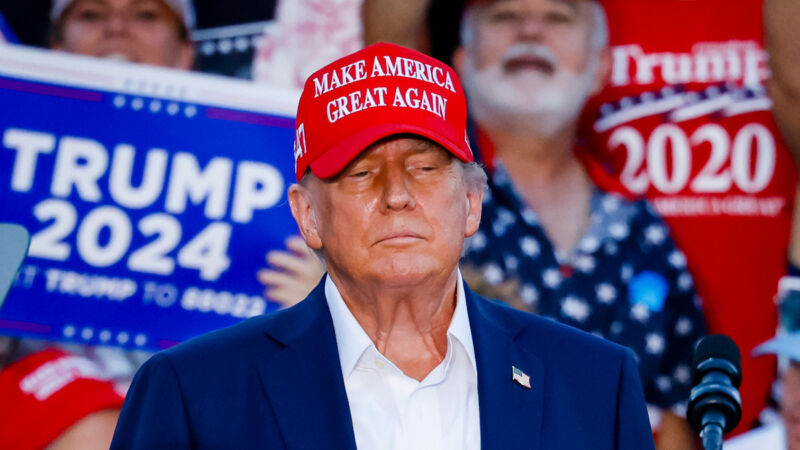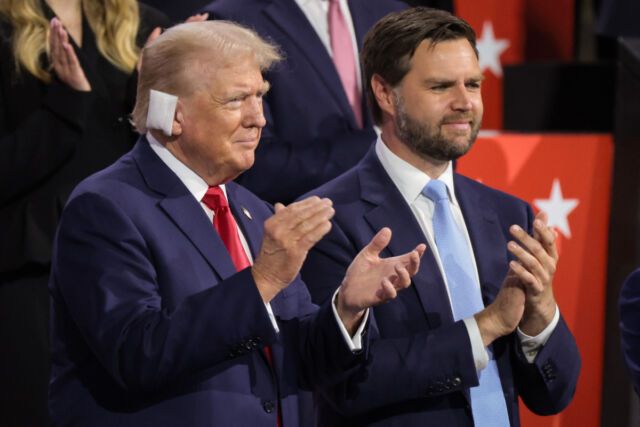
Allies of former President Donald Trump have reportedly drafted a sweeping AI executive order that aims to boost military technology and reduce regulations on AI development, The Washington Post reported. The plan, which includes a section titled “Make America First in AI,” signals a dramatic potential shift in AI policy if Trump returns to the White House in 2025.
The draft order, obtained by the Post, outlines a series of “Manhattan Projects” to advance military AI capabilities. It calls for an immediate review of what it terms “unnecessary and burdensome regulations” on AI development. The approach marks a contrast to the Biden administration’s executive order from last October, which imposed new safety testing requirements on advanced AI systems.
The proposed order suggests creating “industry-led” agencies to evaluate AI models and safeguard systems from foreign threats. This approach would likely benefit tech companies already collaborating with the Pentagon on AI projects, such as Palantir, Anduril, and Scale AI. Executives from these firms have reportedly expressed support for Trump.
Simultaneously, The Washington Post notes that the conservative Heritage Foundation is developing its own set of AI policies as part of Project 2025, a blueprint for a potential second Trump term. While Trump’s campaign has not officially endorsed this plan, it includes proposals to enhance AI research and development in the US while restricting China’s access to the technology.
While the mainstream rise in generative AI has largely taken place after Trump left office, Trump himself has a history with AI: He signed an executive order on the topic in December 2020 that established guidelines for the use of AI in federal agencies.
Changing political winds
Former Trump officials at the America First Policy Institute played a key role in crafting the draft order obtained by the Post, according to a source familiar with the matter. The America First Policy Institute told the Post that the draft order does not represent its official position and that it does not coordinate with any candidate or campaign. But it’s a potential preview of dramatic policy shifts on AI under a second Trump administration, which is reflected in the Republican party’s official 2024 platform.
“We will repeal Joe Biden’s dangerous Executive Order that hinders AI Innovation, and imposes Radical Leftwing ideas on the development of this technology,” the GOP platform document states. “In its place, Republicans support AI Development rooted in Free Speech and Human Flourishing.”
The policy aligns with changing political winds in Silicon Valley. Some tech executives and venture capitalists who previously backed Democrats now support Trump. Axios reports that billionaire VCs Marc Andreessen and Ben Horowitz each will make donations to former President Trump’s election effort. And in the wake of a recent assassination attempt on Trump, Elon Musk has publicly endorsed Trump’s presidential bid and pledged financial support to a pro-Trump PAC.

On Monday, Trump announced Ohio Senator J.D. Vance as his running mate for the 2024 election in a move that has reportedly energized supporters of rapid AI development. Vance, known for his venture capital background and ties to Silicon Valley figures like Andreessen and Peter Thiel, has voiced opposition to AI regulation and criticized Big Tech companies for promoting government oversight.
Vance has also voiced support for open source AI in the past, making the picture slightly more complicated. But so far, nothing in AI has been simple, and in some ways, the concept of “AI” has eclipsed its technical roots to become more of an idea than a technology. In a field full of beliefs that range from creating godlike entities to the destruction of humanity in sci-fi scenarios or wasteful environmental harm, battle lines have already been drawn, and AI is already deeply political.
